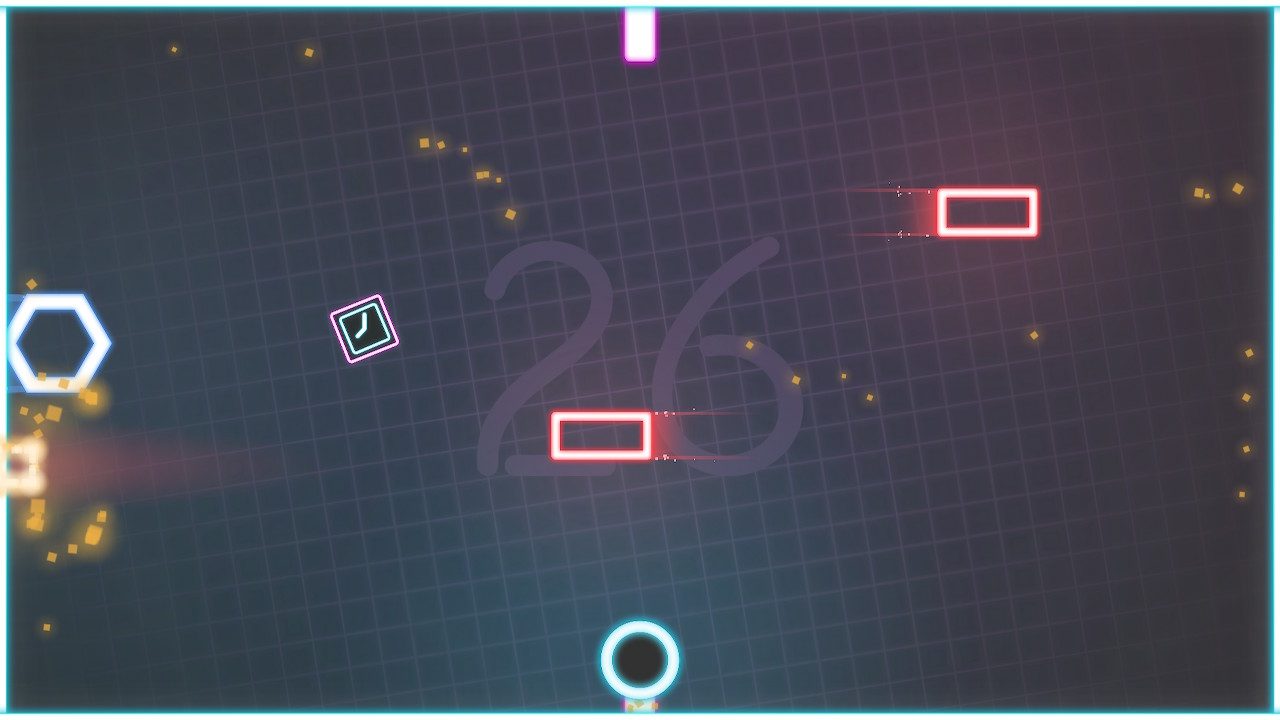Ding Dong XL
Ding Dong XL couldn’t be simpler, so it’s hard to love, but easy to enjoy
Ding Dong XL is a game that is so basic in concept, it’s difficult to get very excited about. It does, however, offer addictive, challenging gameplay for those with a strong competitive streak.
This is the second one-button game I’ve got on the Switch, after Super One More Jump. That game is an ‘endless runner’, but I’d hesitate to call Ding Dong XL that, even if it … sort of is? An ‘endless batter’, maybe.
Anyway, these types of game typically require least in manual dexterity, and most in reflexes, reactions, and foresight. Ding Dong XL is exactly this: Pong (if you controlled both bats, and they were ‘sticky’, and you couldn’t move them from the centre) + the traffic from Frogger (with a lot more variation). Plus power-ups.
It’s essentially a game of ‘chicken’, a judgement on exactly when you need to fire the ball from one side to the other, in order to avoid colliding with the junk flying across, in either direction — usually both. Each piece of debris does one of a variety of different things, indicated by its colour: some expand and contract, some rotate, etc. A small number of power-ups do things like slow obstacles down, allow you to crash straight through them, or destroy all the bad stuff currently on-screen.
The neon graphics, rhythmic soundtrack, and in-your-face animation remind me very much of Lumines; there’s always a lot going on in the background and periphery, as the game constantly tries to put you off, daring you to fail. This is a welcome refinement to the core gameplay, but it can get frustrating at times.

Ding Dong XL also has a couple of interesting features which add interesting twists:
#1 If you just wait around without pushing the button for a while, your orb starts expanding. If you wait too long, it explodes (ouch) and game over. This also has the effect that it gradually gets more difficult to make it safely across, as you wait, since you become more of a target.
#2 If you just ‘nick’ the edge of some debris, you escape unharmed and gain a point. It’s pretty difficult and dangerous to actively play for these bonuses, but it’s very possible when you get the slowdown power-up. It also adds an element of forgiveness, which is unusual and very welcome indeed.
Ding Dong XL’s concept is so simple, it inevitably succeeds or fails on how entertaining the core gameplay and feedback loop is. And, for me at least, it does very well in this regard. When you die, you don't die unfairly. In fact, you always know you’re going to die before it happens: your impending doom is obvious as soon as you’ve propelled yourself towards it. It’s incredibly frustrating, but has that wonderful element of convincing you that you’d never make that same mistake again. Runs don’t last all that long anyway, and restarting is quick and painless.
So, what’s here is well done — there just isn’t that much here. The more you play, the more stuff appears to get in your way, but nothing really changes too much. It’s essentially a ‘rinse-repeat’ cycle: start, stay alive as long as you can, set a new high score, try to stay alive longer the next time, etc. It’s a compelling challenge if you like setting personal bests, but it’s certainly the kind of game that some will tire of pretty quickly.

The greatest omission here is a global high-score table; for a game so focussed on points, that’s a pretty big defect. I’m still not sure how impressive my highscore of 231 is, although I suspect it’s pretty mediocre! Apparently, the developer has a high score table planned; this would certainly add a little extra to the challenge.
The Verdict
🤔
I’m really torn on this one. On one hand, it’s a simplistic game with probably limited long-term appeal. On the other, it’s very cheap, and really well executed. I hesitate to recommend something just because it’s cheap, but Ding Dong XL has enough additional value to deserve a place in any Switch library.
I’ve played Ding Dong XL for 2–3 hours in total. It’s great in handheld mode, which is understandable given its roots as a mobile game. It’s probably ideal for commuting or any other short journeys, given the length of a typical run.
I paid £0.89 for Ding Dong XL, which is almost too little to consider.